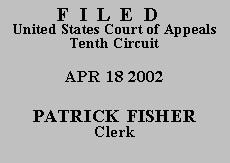

| RICKY K. CLINESMITH, |
|
Mr. Clinesmith pleaded guilty in Okfuskee County, Oklahoma District Court to one count of possession of marijuana with intent to distribute and was sentenced to thirty years imprisonment with fifteen years suspended. He was represented by counsel when he entered his plea, but did not file a direct appeal of the conviction or attempt to withdraw the plea. Mr. Clinesmith subsequently filed an application for post-conviction relief, claiming an illegal search, insufficient evidence, and lack of a knowing and voluntary guilty plea. The Oklahoma district court denied the application and was affirmed by the Oklahoma Court of Criminal Appeals ("OCCA"), which concluded that Mr. Clinesmith had waived his right to post-conviction relief by not pursuing a direct appeal of his conviction.
Mr. Clinesmith then filed a habeas petition in federal court, claiming that his conviction was obtained through an illegal search, and, for the first time, that he received ineffective assistance of counsel. After referral of the matter from the district court and a response from the State, the magistrate judge issued a Report and Recommendation, recommending dismissal of the petition. R. Doc. 10. The magistrate judge concluded that Mr. Clinesmith failed to meet the Supreme Court's "cause and prejudice" requirement for overcoming a procedural default. See Coleman v. Thompson, 501 U.S. 722, 750 (1991). The district court also concluded that Mr. Clinesmith failed to show that application of the procedural bar would result in a fundamental miscarriage of justice. The district court adopted the magistrate's Report and Recommendation in its entirety and denied Mr. Clinesmith's petition.
On appeal, Mr. Clinesmith advances the same arguments he brought in the district court. He claims further that the district court's rejection of his petition because of the procedural bar is contrary to the Supreme Court's decision in Ake v. Oklahoma, 470 U.S. 68, 7475 (1985). Unlike Ake, however, the procedural bar in this case was the exclusive basis for the state court's holding, see Steele v. Young, 11 F.3d 1518, 1521 (10th Cir. 1993), and, in any event, the Supreme Court has "never applied [Ake's] rule regarding independent state grounds in federal habeas." Coleman, 501 U.S. at 741. We note also that Mr. Clinesmith's failure to raise his ineffective assistance of counsel claim in state post-conviction relief proceedings prevents federal review and constitutes an independent and adequate state procedural bar. See Medlock v. Ward, 200 F.3d 1314, 1323 (10th Cir. 2000); Moore v. Reynolds, 153 F.3d 1086, 1097 (10th Cir. 1998).
We have carefully reviewed Petitioner's appellate brief, the magistrate judge's recommendation, and the appellate record and we conclude that the magistrate judge was correct in determining that Mr. Clinesmith failed to establish the necessary requirements to overcome the state procedural bar.
Accordingly, for substantially the reasons set forth by the magistrate judge, we DENY Petitioner's request for a COA, DISMISS his appeal, and DENY his motion to proceed in forma pauperis as moot.
Entered for the Court
Paul J. Kelly, Jr.
Circuit Judge
*. This order and judgment is not binding precedent, except under the doctrines of law of the case, res judicata, and collateral estoppel. This court generally disfavors the citation of orders and judgments; nevertheless, an order and judgment may be cited under the terms and conditions of 10th Cir. R. 36.3.
**. After examining the briefs and the appellate record, this three-judge panel has determined unanimously that oral argument would not be of material assistance in the determination of this appeal. See Fed. R. App. P. 34(a); 10th Cir. R. 34.1(G). The cause is therefore ordered submitted without oral argument.